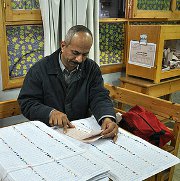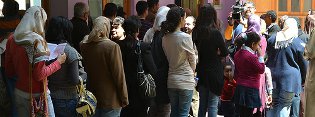
Egypt (MNN) — For what many say is the first time in history, Egyptians are heading to the polls today and tomorrow for a truly democratic presidential election.
It's been over a year since the nation ousted Hosni Mubarak from presidency. In the time the nation has gone without a definite ruler, poverty has increased from 42% to 47%, and Egyptians are growing increasingly restless. Now all presidential candidates promise a better Egypt.
But who will be able to deliver on those promises? Egyptians will cast their opinions at the polls as they choose between five candidates vying for presidency.
Mohammed Musri is the leading candidate for the Muslim Brotherhood, a group that's been seeking power nearly since its formation in 1928. NBC's Richard Engel says the Brotherhood's slogan is "Islam is the solution," and Islam will thus be looked to in order to guide every governing decision. It would seem that if Musri is elected, Egypt's relationship with Israel as well as the United States could go quickly downhill.
Engel says the Brotherhood claims to have a million activists in Egypt, all of whom are likely to cast their votes for Musri today or tomorrow.
At the same time, Abdel Monein Abu al-Fotouh seems to have claimed the hearts of many young Egyptians. Tom Doyle with E3Partners points out that although Fotouh has declared his favor for Sharia Law, has a decades-long history with the Muslim Brotherhood, and is now being supported by Islamic extremist group the Salifists, he has also made some serious leftist statements, drawing in young people.
Many Christians remain unconvinced that Fotouh has left the Muslim Brotherhood and believe that he has deceived people about what he stands for in order to secure the office.
Two others candidates, Amer Moussa and Ahmed Shafiq, are known as "remnant" candidates, or former Mubarak supporters. Revolutionaries in favor of a completely new regime likely will not vote for these two, nor will Muslim Brotherhood or Salifist supporters. If Moussa or Shafiq win, the Muslim Brotherhood and Salifists will likely be forced back underground or in prison, points out a blogger with The Jerusalem Post.
If no one leaves with over a 50% majority after Thursday, a run-off vote will be held on June 16-17 between the two candidates with the most votes.
Doyle seems fairly convinced that whatever happens, Sharia Law and the Muslim Brotherhood are likely to arrive in Egypt's government in coming months.
Doyle points out that on the voting scene, "You've got the secular Muslims that have kind of been marginalized because they're seen as Mubarak's people, and they were corrupt, so they're to the side. The Christians never really have a strong voice there obviously. So then what's left are the hardline Muslims."
If Sharia Law is implemented, though, even the hardliners won't be happy for long, predicts Doyle. "If the Brotherhood gets in, maybe there'll be a momentary celebration. But I'll tell you what: I think it will just be like Iran. There may be some jubilation for a while, then they're going to realize what hardline Islam is going to do to their country, and people are going to hate it."
Things will only get harder for Christians under strict Islamic rule as well. And yet, the Gospel currently is spreading more than E3 has seen it do in 12 years. Christians will move forward with the Great Commission no matter what is to come.
"Egypt is in a great spiritual battle," says Doyle. "Hearts are open, and hardline Islam is trying to shut that down. One of the best ways they can do that is to get into power. But even if they do, it's not going to stop the believers."

